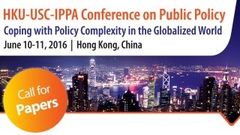Call for Papers: HKU-USC-IPPA Conference on Public Policy in Hong Kong (10.-11.6.2016)
12.01.2016
Vom 10.06 -11.06.2016 findet in Hong Kong die HKU-USC-IPPA Conference on Public Policy statt. Für das Thema „Complexity and the politics of knowledge policies: multi-issue, multi-level and multi-actor” werden noch Paper gesucht, die für die Konferenz spätestens bis zum 30.01.2016 sind.
Genauere Erläuterung des Themenkomplexes:
The complexity of policy processes and the relationship between instrument choice and impact have always intrigued scholars of politics, public policy, and public administration. Indeed, complexity constitutes a key element in established public policy theoretical frameworks such as punctuated equilibrium, multiple streams, and is at the core of Lindblom’s science of ‘muddling through’. In recent years, policy scholars such as Cairney and Geyer have pushed for embracing complexity as a foundation and starting point for policy analysis. These scholars advocate a ‘complexity theory’ approach that enables researchers to attend to both top-down as well as bottom-up dynamics, interests and behaviour of various actors, and how policy ideas, goals and instruments are interpreted and transformed during the policy process.
This panel engages with the complexity approach in public policy through the case of knowledge policy, which refers to basic and applied research, innovation, and higher education. The issues at the core of these policy areas are cross-cutting, which means that their governance does not neatly fall into one single policy domain (multi-issue). Indeed, they often require collaboration across multiple policy sectors as the different aspects of knowledge policies are under jurisdiction of different ministries (multi-actor). Due to increasing processes of international and subnational coordination, developments in the knowledge policy domain are a multi-level endeavour. The case of knowledge policy thus offers a promising empirical avenue to explore the key concepts at the heart of ‘complexity theory’, as well as a bridge for interdisciplinary theoretical exchanges. We seek submissions that address cross-cutting issues in the knowledge policy domains and the multi-actor and multi-level policy processes involved.
Submissions are invited from all theoretical schools using quantitative, qualitative or mixed-methods approaches, but should demonstrate a good conceptual understanding of the complexity of knowledge policies with a clear empirical, preferably comparative, focus.
Weitere Informationen finden Sie hier!
